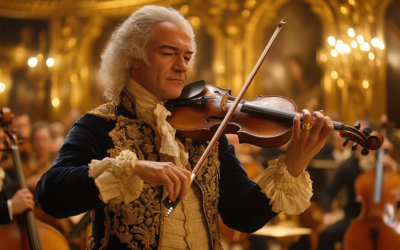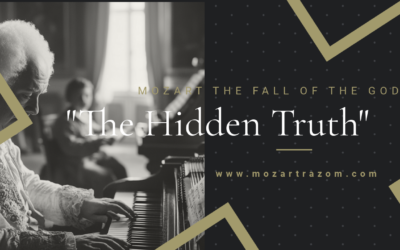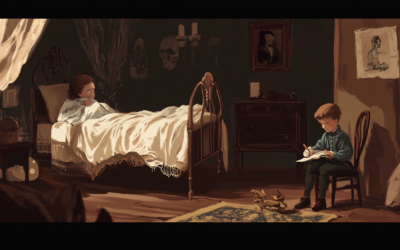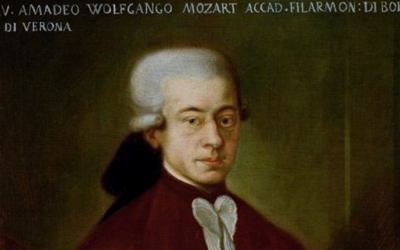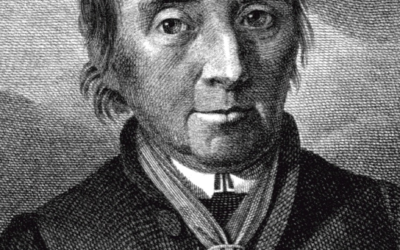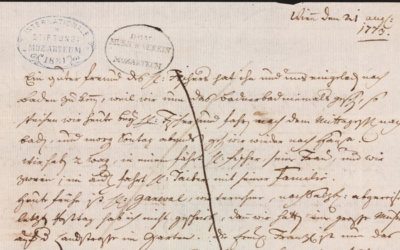Mozart Unveiled on Radio Vaticana:
A Landmark Broadcast
Experience the power of critical musicology as Luca Bianchini and Anna Trombetta present their groundbreaking insights on Mozart’s legacy on the prestigious Radio Vaticana.
Each episode unveils secrets and challenges the myths surrounding this celebrated composer.
Mozart: The Fall of the Gods
This book compiles the results of our studies on 18th-century music and Mozart, who has been revered for over two centuries as a deity. We dismantle the baseless cult of Mozart and strip away the clichés that falsely present him as a natural genius, revealing the contradictions in conventional biographies. In this work, divided into two parts, we identify and critically analyze several contradictory points in the vast Mozart bibliography. Each of the nearly 2,000 citations is meticulously sourced, allowing readers to verify the findings. This critical biography of Mozart emerges from these premises, addressing the numerous doubts raised by researchers.
"Mozart is not what history wants us to believe—sometimes, the truth is stranger than the myth."
Mozart: The Fall of the Gods
e esteemed musicologists Luca Bianchini and Anna Trombetta are bringing their provocative insights on Mozart to none other than Radio Vaticana, the Vatican’s highly revered station. Through a series of enlightening episodes of L’Arpeggio, Bianchini and Trombetta will delve into the myth surrounding Mozart, revealing intricate details from their groundbreaking book, Mozart: The Fall of the Gods. In a truly prestigious event, Radio Vaticana honors these scholars’ in-depth research and fearless questioning of Mozart’s legacy, underscoring the importance of evidence-based musicology in the modern world.
A Closer Look: The Episodes
First Episode
Introduction – The Birth of the Mozart Myth
Watch here: YouTube
Second Episode
The Quartets
Watch here: YouTube
Third Episode
The Duets and Quintets
Watch here: YouTube
Fourth Episode
Theater Director and The Marriage of Figaro
Watch here: YouTube
Fifth Episode
Divertimento K. 522
Watch here: YouTube
These first ten episodes explore key works of Mozart, presenting a rare, detailed critique that challenges the unexamined adulation Mozart often receives. From operas to quartets, this series promises to illuminate and unsettle long-held assumptions.
Special Feature: The Magic Flute
Explore more about Mozart’s most enigmatic work, The Magic Flute, through exclusive audio and video.
Follow this unparalleled broadcast to uncover a new perspective on Mozart, backed by historical scrutiny and the primary sources that few dare to reveal.
You May Also Like
The Violin Concertos: Mozart’s Borrowed Genius
Mozart’s violin concertos are often celebrated as masterpieces, but how much of the music is truly his? This article delves into the complexities behind the compositions and challenges the authenticity of some of his most famous works, revealing a story of influence, imitation, and misattribution.
#2 The Hidden Truth of Mozart’s Education
In this video, we uncover the hidden truth behind Wolfgang Amadeus Mozart’s early education and challenge the long-held belief in his effortless genius. While history often celebrates Mozart as a child prodigy, effortlessly composing music from a young age, the reality is far more complex.
The London Notebook
The London Notebook exposes the limitations of young Mozart’s compositional skills and questions the myth of his early genius. His simplistic pieces, fraught with errors, reveal a child still grappling with fundamental musical concepts.
The Mozart Question
In this revealing interview, we delve into the lesser-known aspects of Wolfgang Amadeus Mozart’s life, challenging the long-standing myth of his genius. A Swedish journalist explores how Mozart’s legacy has been shaped and manipulated over time, shedding light on the crucial role played by his father, Leopold, in crafting the career of the famed composer.
Georg Nissen and the Missing Notebooks
After Mozart's death, his widow, Constanze, found a steadfast partner in Georg Nikolaus von Nissen, a Danish diplomat who dedicated his life to preserving the composer's legacy. Nissen not only compiled an extensive biography of Mozart but also uncovered and...
Letters Under Surveillance
In a world without privacy, Leopold Mozart’s letters were carefully crafted not just to inform but to manipulate perceptions. His correspondence reveals a calculated effort to elevate his family’s status while avoiding any mention of failure or controversy.


